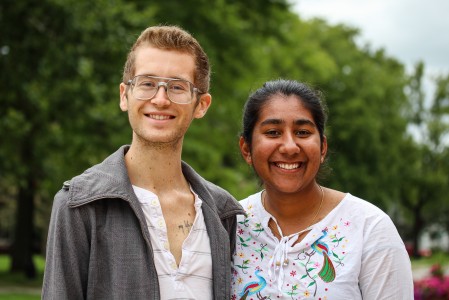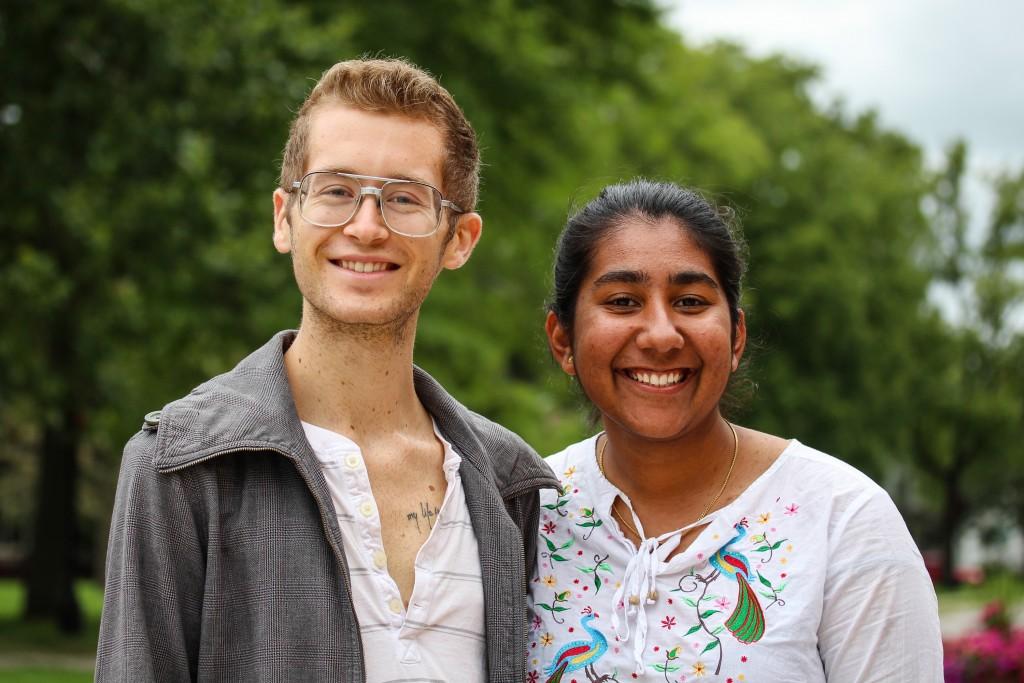This past summer, Anthony Wenndt ’15 and Pearl Sawhney ’16 completed the Wallace-Carver Fellowship, which allowed them to connect with research centers of their choice and team up with scientists to tackle issues pertaining to world hunger. The Fellowship was conducted in partnership with the U.S. Department of Agriculture and the World Food Prize.
Wenndt, a Russian and biology double major, chose to attend the Agriculture Research Services’ (ARS) Crops Pathology and Genetics Research Center in Davis, Calif.
“My choice to work at that particular unit of the agricultural research service was motivated by my desire to gain more advanced skill in molecular biology techniques,” Wenndt said. “My career interest is in plant pathology, and so my research over the summer with this fellowship was more about plant breeding, but it did expose me to those molecular biology techniques that I desired while still allowing me to pursue my passion for food security and agricultural research.”

Photo by Tela Ebersole
Sawhney, a biological chemistry major, chose to work at the ARS National Animal Disease Center in Ames, Iowa.
“I had never done any work on animal diseases before,” Sawhney explained as her reason for choosing the center in an email to The S&B. “I thought that the research being conducted in the lab was extremely interesting and thought it would be a really great learning experience to dive into a topic that I knew little about.”
Wenndt and Sawhney were driven towards these internships from widely different paths, but their goals are linked by the desire to help others and to learn more about the world.
“The dominant motivating factor in all of my work is hunger relief and food security, especially on the global scale,” Wenndt said. “Everything I do, scientific or not, is geared toward that end goal: hunger relief, food security … I’m in it to improve agriculture and eventually influence the food system.”
Sawhney also arrived at the Wallace-Carver Fellowship with a long history of experience in scientific research, dating her first experience with independent scientific research to her eighth grade science fair.
“I had a really great experience researching and conducting my own experiment and that made me want to continue doing research throughout high school and into college,” she wrote.
Sawhney added that her passion for food and hunger research came from her own experiences outside the United States.
“My views on food-related subjects, like hunger and food shortages were shaped in my early childhood through my family’s visits to India every year,” Sawhney wrote. “In the U.S., these issues are definitely present but aren’t always as evident. It was through my travels to India that I really saw what it means to be hungry and that has always stuck with me.”
Wenndt and Sawhney shared that they were aware of the issues surrounding food poverty even before coming to college.
“I still think it is important to remember that even if we aren’t involved in the production of agriculture we are all involved in its consumption whether it be plants or animals,” Sawhney wrote.
Wenndt, who, like Sawhney, is from the Midwest, said that going to Grinnell has furthered his interest in the real-life application of food studies.
“Growing up in Iowa, my location in Grinnell specifically is not very different from home,” Wenndt said. “[The] Grinnell College community has been immensely influential in my pursuit of food security and hunger relief, and especially my application of the sciences to that cause, just in that in my home community, agriculture is not necessarily seen as an issue of intellectual merit, I guess.”
Wenndt added through scientific research or other means, everyone can all do their part to address the issue of world hunger.
“The most important thing that people can do on the individual level is to make themselves aware of the issues impacting their food system, especially in this time, this era of rapidly changing climatic conditions and booming populations,” Wenndt said. “It’s going to be increasingly relevant that societies around the world become aware of their food systems and how to progress sustainably into an era where food security could become a reality.”






























































Rosalyn Clauson • Sep 21, 2014 at 10:05 pm
That was a great article. I try to all I can to keep items out of the land fill by recycling everything I can. We are so lucky to have always had all we wanted to eat. It’s hard to comprehend how it must be to wonder where to find food to eat for the next meal. Keep up the good work! Love you